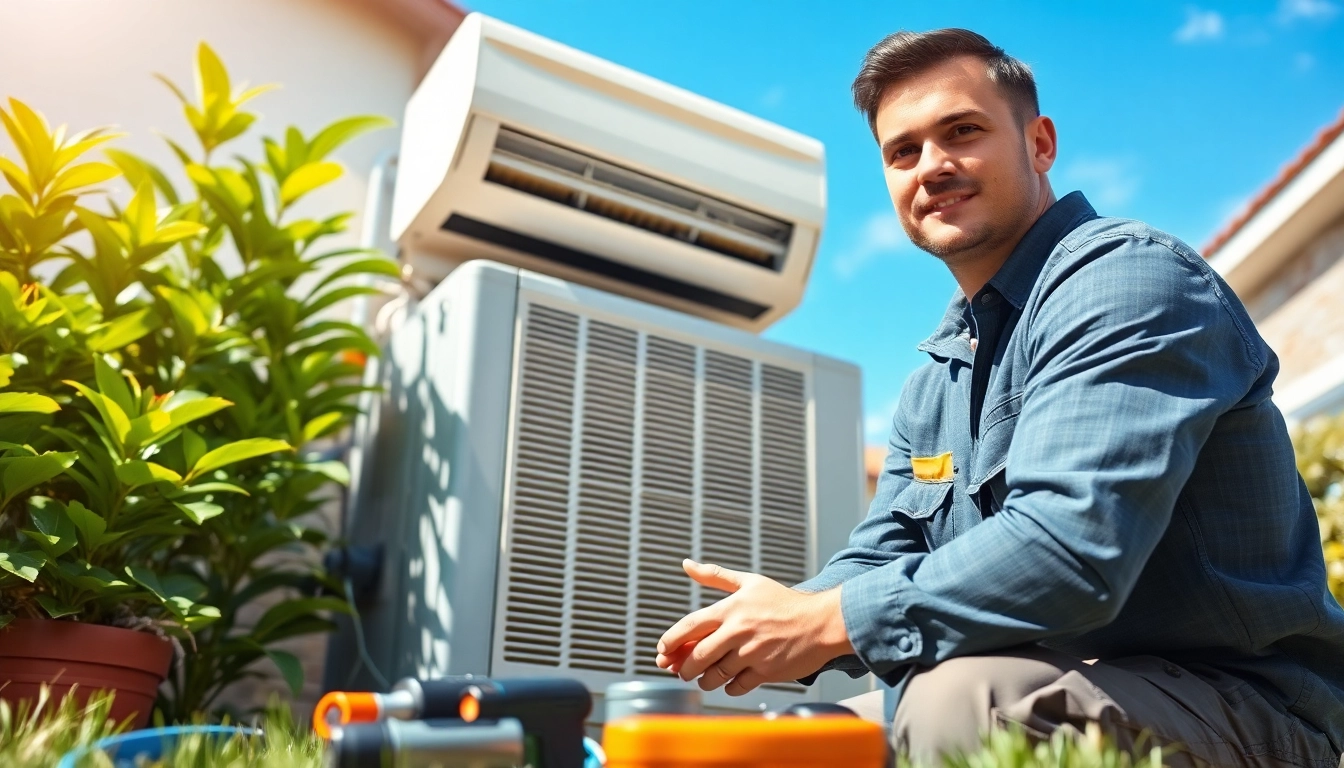Understanding AC Systems and Their Importance
Air conditioning systems are crucial for maintaining comfort in residential and commercial spaces, especially in hot regions like Mesa, AZ. These systems not only regulate temperature but also manage humidity levels, improving overall indoor air quality. Proper functioning of AC units contributes significantly to the safety and health of occupants, making ac repair mesa az a vital consideration for homeowners and businesses alike.
Types of Air Conditioning Systems
Understanding the different types of air conditioning systems is essential for homeowners looking to maintain or repair their units effectively. There are several primary categories of AC systems:
- Central Air Conditioning: This system uses a network of ducts to distribute cool air throughout a building. Central AC is ideal for larger spaces and provides consistent cooling and heating.
- Split System AC: Comprising an indoor and outdoor unit, split systems are more energy-efficient and quiet compared to central units. They are suitable for homes without existing ductwork.
- Window Units: Perfect for single rooms, window AC units are cost-effective and easy to install. However, they may not be as efficient for larger spaces.
- Portable AC: These units can be moved from room to room, offering flexibility and convenience. They are ideal for renters or those who may need temporary cooling solutions.
Common AC Problems in Mesa AZ
As air conditioning systems endure the intense heat of Mesa, residents frequently encounter specific issues that need prompt attention to avoid costly repairs:
- Refrigerant Leaks: A common problem leading to inadequate cooling. Low refrigerant can compromise system efficiency and potentially damage the compressor.
- Condenser Coil Issues: Dirt and debris can build up on the coils, hindering heat exchange and causing the system to overheat.
- Thermostat Malfunctions: A faulty thermostat can lead to incorrect temperature readings, affecting the system’s performance.
- Electrical Failures: Faulty wiring and electrical problems can lead to a complete shutdown of the AC unit.
Benefits of Regular Maintenance
Engaging in regular maintenance of air conditioning systems not only extends the lifespan of the unit but also ensures efficient operation. Key benefits include:
- Improved Efficiency: Regular checks help maintain the efficiency of AC systems, reducing energy expenses.
- Enhanced Longevity: Just like any machine, regular upkeep contributes to a longer operational life for your air conditioning unit.
- Better Air Quality: Maintenance prevents dust and mold buildup, ensuring cleaner air is circulated within your home.
- Fewer Repair Needs: Addressing minor issues early can prevent more significant problems and expensive repairs later on.
Choosing the Right AC Repair Service
Selecting an appropriate service for AC repair is as essential as maintaining the unit itself. The right technician can make all the difference in terms of service quality and system longevity.
Key Questions to Ask Your Technician
When you engage a technician for AC repair mesa az, consider asking the following questions to gauge their expertise and reliability:
- What certifications do you have? Ensuring that your technician is certified can give you confidence in their knowledge and skills.
- Can you provide references or reviews? Customer reviews and testimonials are an excellent way to assess past performance and service quality.
- What is your warranty policy? Understanding warranty options can protect you in the long run if issues arise again.
- What does the diagnosis and repair process involve? A transparent technician will explain their methods and the expected outcome of any repairs.
Evaluating Customer Reviews and Ratings
Customer feedback is invaluable in finding a reputable repair service. Resources like Yelp, Google Reviews, or social media provide insights into how well a company performs. When evaluating reviews, consider:
- Overall Rating: Look for a service with a high average rating from numerous customers.
- Recent Feedback: Focus on recent reviews to get a sense of current customer experiences.
- Diversity of Reviews: Review a range of feedback to identify if the service consistently meets customer expectations across different service areas.
Understanding Service Contracts and Warranties
Service contracts and warranties protect consumers from unexpected costs following repairs. A good understanding of these agreements can safeguard your investment:
- Comprehensive Coverage: Ensure that the contract includes details about parts and labor coverage for repairs that may arise during the contract period.
- Duration of Warranty: The terms of service should clearly state how long the warranty lasts and what conditions apply.
- Renewal Options: Inquire about the possibility of contract renewal conditions or upgrades after the initial period.
DIY AC Troubleshooting Tips
While some AC issues require professional handling, there are troubleshooting techniques homeowners can perform. Knowing these can save time and money while ensuring your home stays comfortable.
Basic Maintenance You Can Perform
Homeowners can take several easy steps to maintain their AC systems and potentially avoid serious problems:
- Regular Filter Changes: Replacing or cleaning air filters every 1-3 months improves airflow and efficiency.
- Clean the Condenser Coils: Removing debris from outside coils can prevent overheating and improve efficiency.
- Keep Surrounding Areas Clear: Ensure there are no obstructions to the outdoor unit to enhance airflow.
- Check Thermostat Settings: Ensure that your thermostat is set to the correct temperature and mode.
Signs You Need Professional Help
It’s crucial to recognize when a problem exceeds your capacity to fix it. Signs that indicate the need for professional help include:
- Insufficient Cooling: If your system is running but not effectively cooling, it could indicate a refrigerant issue.
- Unusual Noises: Sounds like grinding or squealing may suggest mechanical failures that need expert attention.
- Frequent Cycling: If the AC frequently turns on and off, this could indicate a short cycle problem, requiring diagnosis.
- Unpleasant Odors: Foul smells might indicate electrical issues or mold in the system.
Cost-effective Solutions for Common Issues
Addressing common AC problems promptly can save you significant costs in repairs and energy bills. Here are some budget-friendly solutions:
- Regular Maintenance: Investing in periodic check-ups can prevent more significant malfunctions down the line.
- Seal Ducts: If you have a central AC system, sealing ducts can reduce energy loss and improve efficiency.
- Upgrade Thermostat: A programmable or smart thermostat can optimize energy use and lower costs.
Preparing for an AC Repair Appointment
Preparation can facilitate a more efficient service experience. Knowing what to expect during an appointment will not only save time but also help you understand and track services rendered.
What to Expect During a Service Call
During a service call, your technician will follow a systematic process to diagnose and repair your unit:
- Initial Assessment: The technician will assess the system and any observable issues based on your report.
- Diagnostic Testing: They may run tests to measure performance and efficiency, identify leaks, or troubleshoot electrical issues.
- Recommendations: After assessments are concluded, the technician will outline findings and provide recommended next steps, including repair options.
Preparing Your Home for Technicians
To ensure a smooth repair process, consider taking the following steps:
- Clear Access to Units: Ensure that the technician can easily access the indoor and outdoor units by removing obstacles.
- Indicate Specific Problems: Clearly communicate any symptoms or problems you’ve noticed that may assist the technician in diagnosing issues.
- Maintain a Comfortable Environment: If possible, keep the home temperature comfortable as technicians work, especially during hot weather.
Understanding Pricing and Estimates
Gaining an insight into pricing and estimating costs can help you budget appropriately for repairs:
- Comprehensive Estimates: Request detailed estimates that cover parts, labor, and additional fees.
- Comparison Shop: Gathering estimates from several service providers can help you understand average costs and find competitive pricing.
- Inquire About Fees: Understanding what services may incur extra fees, such as emergency calls or after-hours service, is essential to avoid surprises.
Maximizing the Life of Your AC Unit
By taking proactive steps, homeowners can significantly extend the life expectancy of their air conditioning systems. Understanding longevity and efficiency best practices is key.
Best Practices for Seasonal Preparation
As seasons change, so do the demands placed on your air conditioning system. The following practices can ensure your system remains effective year-round:
- Pre-Season Checkups: Schedule a professional maintenance check at the beginning of the cooling season to address any potential issues before peak usage.
- Winterization: For those with outdoor units, winterizing the system can protect components from harsh environmental conditions.
- Cleaning and replacing filters: As mentioned earlier, ensure the filter is clean to avoid airflow issues and maintain efficiency.
Energy Efficiency Tips for Homeowners
Improving energy efficiency not only benefits the environment but also helps in reducing monthly utility bills. Consider these tips:
- Utilize Shades and Blinds: Keeping windows covered during the day can minimize heat penetration, reducing the workload on AC systems.
- Invest in Energy-Efficient Models: If upgrading, opt for models with high SEER (Seasonal Energy Efficiency Ratio) ratings to maximize efficiency.
- Implement Programmable Thermostats: Set back the temperature during off-peak hours or when the house is empty to save energy.
Identifying When to Replace vs. Repair
Understanding when to replace an aging AC unit versus opting for repairs can be challenging. Key factors to consider include:
- Age of the Unit: If the system is over 10-15 years old, replacement might be more cost-effective than continual repairs.
- Cost of Repairs vs. Replacement: If repair costs exceed 50% of the price of a new unit, it’s typically more sensible to invest in a new system.
- Frequency of Repairs: If your system requires frequent repairs, it may be time to consider a new, more reliable unit.


